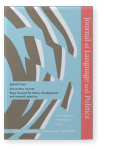Towards webs of equivalence and the political nomad in agonistic debate
Contributions from CDA and scales theory
Discourse theorists often defend their discursive stance on ‘reality’ and the material with reference to Laclau and Mouffe’s quote that, while an “earthquake or the falling of a brick…exist externally to thought,” they cannot “constitute themselves as objects outside any discursive conditions of emergence”.
While fully endorsing this statement, we argue that it does not licence discourse theorists to consider discursive formations divorced from their material context, but obliges us to account for the constraints and affordances of the material conditions on the structuring of the discursive field itself. Drawing on previous work, we argue that material conditions may render discourse systems incommensurate, such that they cannot be articulated through chains of equivalence within a radically restructured field. We suggest as a way forward the concept of the nomadic politician continually traversing between equivalential systems in order to reconfigure and renegotiate key signifiers within the materially-constrained discursive fields of each.
Article outline
- 1.Introduction
- 2.The return of the material
- 3.A case study: Discourse formations, materiality and incommensurability
- 4.Problems posed for the concept of agonism
- 5.A potential way forward: From chains of equivalence and the nomadic subject to the political nomad and networks of intension
- Notes
-
References
References (32)
References
Anderson, Benedict. 1983. Imagined Communities: Reflections on the Origin and Spread of Nationalism. London and New York: Verso.
Bartlett, Tom. 2019. “Scaling the Incommensurate: Discourses of sustainability in the Western Isles of Scotland.” In Critical Policy Discourse Analysis, edited by Nicolina Montesano Montessori, Jane Mulderrig and Michael J. Farrelly, 242–263. Cheltenham: Edward Elgar. 

Bartlett, Tom. 2017. “Context in Systemic Functional Linguistics: Towards scalar supervenience?” In Routledge Handbook of Systemic Functional Linguistics, edited by Tom Bartlett and Gerard O’Grady, 375–390. London and New York: Routledge. 

Bartlett, Tom. 2012. Hybrid Voices and Collaborative Change: Contextualising Positive Discourse Analysis. London and New York: Routledge. 

Bartlett, Tom, Nicolina Montesano Montessori, and Harriet Lloyd. 2017. “Contesting Key Terms and Concepts in the Civil Sphere”. In The Routledge Handbook of Language Awareness, edited by Peter Garrett and Josep Cots. London and New York: Routledge. 

Blommaert, Jan. 2015. “Chronotopes, Scales, and Complexity in the Study of Language in Society.” Annual Review of Anthropology 441: 105–116. 

Blommaert, Jan. 2007. “Sociolinguistic Scales.” Intercultural Pragmatics 4 (1): 1–19. 

Brennan, Ruth. 2015. What Lies Beneath: Probing the Cultural Depths of a Nature Conservation Conflict in the Outer Hebrides, Scotland. University of Aberdeen. Unpublished PhD Thesis.
Buell, Frederick. 2012. “A Short History of Oil Cultures: Or, the Marriage of Catastrophe and Exuberance.” Journal of American Studies 461: 273–293. 

Carpentier, Nico. 2017. “Discourse-Theoretical Analysis (DTA).” In The Routledge Handbook of Critical Discourse Studies, edited by John Flowerdew and John E. Richardson, 272–284. London and New York: Routledge. 

Deleuze, Gilles, and Félix Guattari. 1987 (trsl B. Massumi) [1980]. A Thousand Plateaus. London, New York, Oxford, New Delhi and Sydney: Bloomsbury.
Errejón, Iñigon and Chantal Mouffe. 2016. Podemos: In the Name of the People. London: Lawrence and Wishart.
Fairclough, Norman. 2010. Critical Discourse Analysis: The Critical Study of Language. London and New York: Routledge.
FishUpdate. 2013. “Dismay at Barra Conservation Outcome.” 14 July, 2013. [URL]
Foucault, Michel. 1971. L’ordre du disours. Paris: Gallimard.
Halcrow Group Limited. 2010. Impact Assessment of the Proposed Designation of Two Inshore Special Areas of Conservation in the Sound of Barra and East Mingulay. Edinburgh: Scottish Government. Available online from [URL] [accessed 27 April 2015].
Harvey, David. 1996. Justice, Nature and the Geography of Difference. London: Blackwell.
HIE. 2014. Highlands and Islands Enterprise. The Outer Hebrides. Available online from [URL] [accessed 27 April 2015].
Howarth, D. 1998. “Discourse Theory and Political Analysis.” In Research Strategies in the Social Sciences, edited by Elinor Scarborough and Eric Tanenbaum, 268–203. Oxford: Oxford University Press. 

Laclau, Ernesto. 2005. On Populist Reason. London: Verso.
Laclau, Ernesto, and Chantal Mouffe. 1985. Hegemony and Socialist Strategy. Towards a Radical Democratic Politics. London: Verso.
Marine Scotland Communications. 2014. “Barra Step Forward for Community Management of SAC.” February 20, 2014. [URL]
Montesano Montessori, Nicolina. 2011. “The Design of a Theoretical, Methodological, Analytical Framework to Analyse Hegemony in Discourse.” Critical Discourse Studies 8 (3): 169–182. 

Mouffe, Chantal. 2018. For a Left Populism. London: Verso.
Mouffe, Chantal. 2014. “Agonistic Democracy and Radical Politics.” Pavillion [URL]
Mouffe, Chantal. 2013. Agonistics: Thinking the World Politically. London: Verso.
Mouffe, Chantal. 1994. “For a Politics of Nomadic Identity.” In Travellers’ Tales, edited by George Robertson et al., 105–113. London: Routledge.
Scottish Natural Heritage. n.d. “Protecting Scotland’s Nature: Protected Areas”. [URL]
Thibault, Paul J. 1997. Re-Reading Saussure: The Dynamics of Signs in Social Life. London and New York: Routledge.
Tomasello, Michael. 2003. Constructing a Language: A Usage-Based Theory of Language Acquisition. Cambridge and London: Harvard University Press.
Torfing, Jacob. 1999. New Theories of Discourse: Laclau, Mouffe and Žižek. Oxford: Blackwell.
Whitehead, Alfred North. 1978 (1929). Process and Reality. New York: The Free Press.
Cited by (1)
Cited by one other publication
De Cleen, Benjamin, Jana Goyvaerts, Nico Carpentier, Jason Glynos & Yannis Stavrakakis
This list is based on CrossRef data as of 5 july 2024. Please note that it may not be complete. Sources presented here have been supplied by the respective publishers.
Any errors therein should be reported to them.
